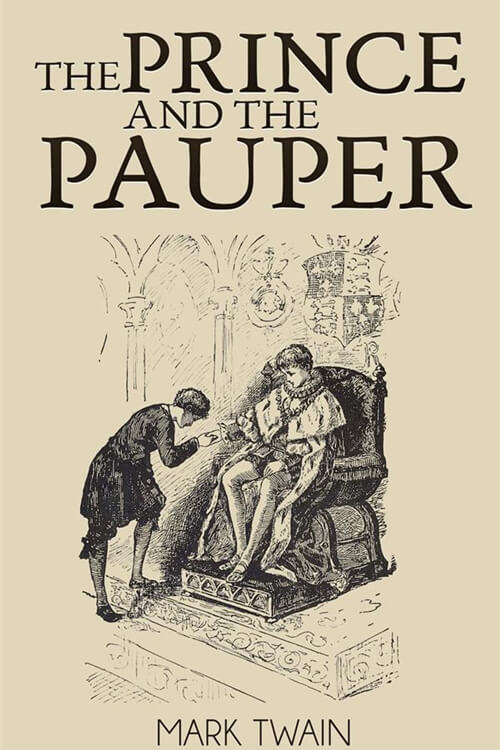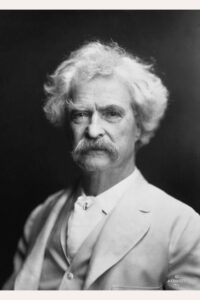
The Prince and the Pauper
In the ancient city of London, on a certain autumn day in the second quarter of the sixteenth century, a boy was born to a poor family of the name of Canty, who did not want him. On the same day, another English child was born to a rich family of the name of Tudor, who did want him. All of England wanted him too. England had so longed for him, and hoped for him, and prayed God for him, that, now that he was come, the people went nearly mad for joy. Mere acquaintances hugged and kissed each other and cried. Everybody took a holiday, and high and low, rich and poor, feasted and danced and sang, and got very mellow; and they kept this up for days and nights together. By day, London was a sight to see, with gay banners waving from every balcony and housetop, and splendid pageants marching along. By night, it was again a sight to see, with its great bonfires at every corner, and its troops of revelers making merry around them. There was no talk in all England but of the new baby, Edward Tudor, Prince of Wales, who lay lapped in silks and satins, unconscious of all this fuss, and not knowing that great lords and ladies were tending him and watching over him—and not caring, either. But there was no talk about the other baby, Tom Canty, lapped in his poor rags, except among the family of paupers whom he had just come to trouble with his presence.
Let us skip several years.
London was fifteen hundred years old and was a great town—for that day. It had a hundred thousand inhabitants—some think double as many. The streets were very narrow, crooked, and dirty, especially in the part where Tom Canty lived, which was not far from London Bridge. The houses were of wood, with the second story projecting over the first, and the third sticking its elbows out beyond the second. The higher the houses grew, the broader they grew. They were skeletons of strong criss-cross beams, with solid material between, coated with plaster. The beams were painted red blue or black, according to the owner’s taste, and this gave the houses a very picturesque look. The windows were small, glazed with little diamond-shaped panes, and they opened outward, on hinges, like doors.
The house which Tom’s father lived in was up a foul little pocket called Offal Court, out of Pudding Lane. It was small, decayed, and rickety, but it was packed full of wretchedly poor families. Canty’s tribe occupied a room on the third floor. The mother and father had a sort of bedstead in the corner; but Tom, his grandmother, and his two sisters, Bet and Nan, were not restricted—they had all the floor to themselves, and might sleep where they chose. There were the remains of a blanket or two and some bundles of ancient and dirty straw, but these could not rightly be called beds, for they were not organized; they were kicked into a general pile, mornings, and selections made from the mass at night, for service.
Read or download Book
Mark Twain
Samuel Langhorne Clemens (November 30, 1835 – April 21, 1910), known by the pen name Mark Twain, was an American writer, humorist, essayist, entrepreneur, publisher, and lecturer.
Biography.
He was praised as the “greatest humorist the United States has produced”, and William Faulkner called him “the father of American literature”.
His novels include The Adventures of Tom Sawyer (1876) and its sequel, Adventures of Huckleberry Finn (1884), with the latter often called the “Great American Novel”. Twain also wrote A Connecticut Yankee in King Arthur’s Court (1889) and Pudd’nhead Wilson (1894), and co-wrote The Gilded Age: A Tale of Today (1873) with Charles Dudley Warner. Twain was raised in Hannibal, Missouri, which later provided the setting for both Tom Sawyer and Huckleberry Finn.
He served an apprenticeship with a printer early in his career, and then worked as a typesetter, contributing articles to his older brother Orion Clemens’ newspaper. Twain then became a riverboat pilot on the Mississippi River, which provided him with the material for Life on the Mississippi (1883). Soon after, Twain headed west to join Orion in Nevada. He referred humorously to his lack of success at mining, turning to journalism for the Virginia City Territorial Enterprise.
He first achieved success as a writer with the humorous story “The Celebrated Jumping Frog of Calaveras County”, which was published in 1865; it was based on a story that he heard at Angels Hotel in Angels Camp, California, where he had spent some time as a miner. The short story brought him international attention. He wrote both fiction and non-fiction. As his fame grew, he became a much sought-after speaker. His wit and satire, both in prose and in speech, earned praise from critics and peers, and Twain was a friend to presidents, artists, industrialists, and European royalty. Although Twain initially spoke out in favor of American interests in the Hawaiian Islands, he later reversed his position, going on to become vice president of the American Anti-Imperialist League from 1901 until he died in 1910, coming out strongly against the Philippine-American War and colonialism.
Twain earned a great deal of money from his writing and lectures but invested in ventures that lost most of it, such as the Paige Compositor, a mechanical typesetter that failed because of its complexity and imprecision. He filed for bankruptcy in the wake of these financial setbacks, but in time overcame his financial troubles with the help of Standard Oil executive Henry Huttleston Rogers. Twain eventually paid all his creditors in full, even though his declaration of bankruptcy meant he was not required to do so. He was born shortly after the appearance of Halley’s Comet and predicted that his death would accompany it as well, dying a day after the comet was at its closest to Earth.






